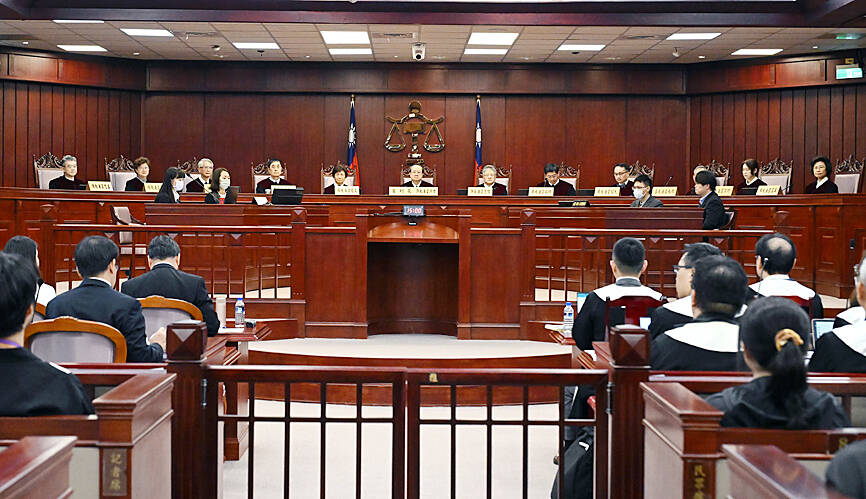The Constitutional Court yesterday ordered the temporary suspension of controversial legislative reform bills passed in May in a move that prevents the legal changes from being implemented.
The suspension is to remain in force until the court rules on the constitutional challenges to the bills, affecting one article of the Criminal Code and eight articles of the Act Governing the Legislative Yuan’s Power (立法院職權行使法), the court said in a news release.
The ruling means the legal amendments promulgated on June 24 cease to be in effect for the time being.

Photo: Liao Cheng-hui, Taipei Times
The legislature is to function according to the original laws before the amendments were passed, the court said.
The legislative reform bills, which passed through the joint efforts of the opposition Chinese Nationalist Party (KMT) and Taiwan People’s Party legislators, would empower lawmakers to compel officials and private citizens to testify in investigative hearings.
The changes would authorize the Legislative Yuan to impose fines on individuals who refuse to comply with summons while criminalizing non-compliance by officials with penalties including imprisonment.
The Presidential Office, the Executive Yuan, the Control Yuan and the Democratic Progressive Party (DPP) caucus separately filed for constitutional interprerations with the court.
The Constitutional Court held a preliminary meeting in a three-hour session on Wednesday last week attended by attorneys and representatives of the four petitioning agencies and the respondents representing the Legislative Yuan.
The justices found sufficient cause to suspend the amendment to Article 15 of the act authorizing the Legislative Yuan to stipulate demands on the president’s conduct during a state of the nation address before the legislature, the court said.
The legislature’s assertion of this power is problematic as it represents an act of self-empowerment that shifts the boundaries between the branches of government, it said.
The implementation of this amendment would result in a constitutional crisis and trigger an escalation of political conflict with the potential to inflict significant harm on the public good, it said.
The temporary suspension of the amendment would allow the president and the legislature to conduct these reports as before, ensuring the business of government can proceed unobstructed, the court said.
The Chinese Nationalist Party (KMT) caucus in a news release said that the Constitutional Court’s ruling “only proves that judicial independence has died.”
“As the largest party in the legislature, the KMT has the responsibility to challenge a constitutional court that lacks autonomy and soulless justices to defend the spirit of the rule of law in the Republic of China,” it said.
The party remains committed to participating in the constitutional litigation in an effort to “defend the last hope for freedom and democracy,” the caucus said.
The court’s speedy decision to suspend the legislative reform bills and dismissal of the KMT’s motion for recusals are proof of the DPP’s control over the justices, it added.
DPP caucus secretary-general Rosalia Wu (吳思瑤) urged the opposition to refrain from slandering the justices.
The DPP caucus respects the Constitutional Court’s ruling and is doing its best to prepare for the legal arguments on Aug. 6, she said.

DAREDEVIL: Honnold said it had always been a dream of his to climb Taipei 101, while a Netflix producer said the skyscraper was ‘a real icon of this country’ US climber Alex Honnold yesterday took on Taiwan’s tallest building, becoming the first person to scale Taipei 101 without a rope, harness or safety net. Hundreds of spectators gathered at the base of the 101-story skyscraper to watch Honnold, 40, embark on his daredevil feat, which was also broadcast live on Netflix. Dressed in a red T-shirt and yellow custom-made climbing shoes, Honnold swiftly moved up the southeast face of the glass and steel building. At one point, he stepped onto a platform midway up to wave down at fans and onlookers who were taking photos. People watching from inside

A Vietnamese migrant worker yesterday won NT$12 million (US$379,627) on a Lunar New Year scratch card in Kaohsiung as part of Taiwan Lottery Co’s (台灣彩券) “NT$12 Million Grand Fortune” (1200萬大吉利) game. The man was the first top-prize winner of the new game launched on Jan. 6 to mark the Lunar New Year. Three Vietnamese migrant workers visited a Taiwan Lottery shop on Xinyue Street in Kaohsiung’s Gangshan District (崗山), a store representative said. The player bought multiple tickets and, after winning nothing, held the final lottery ticket in one hand and rubbed the store’s statue of the Maitreya Buddha’s belly with the other,

‘COMMITTED TO DETERRENCE’: Washington would stand by its allies, but it can only help as much as countries help themselves, Raymond Greene said The US is committed to deterrence in the first island chain, but it should not bear the burden alone, as “freedom is not free,” American Institute in Taiwan Director Raymond Greene said in a speech at the Institute for National Defense and Security Research’s “Strengthening Resilience: Defense as the Engine of Development” seminar in Taipei yesterday. In the speech, titled “Investing Together and a Secure and Prosperous Future,” Greene highlighted the contributions of US President Donald Trump’s administration to Taiwan’s defense efforts, including the establishment of supply chains for drones and autonomous systems, offers of security assistance and the expansion of

STREAMLINED: The dedicated funding would allow the US to transfer equipment to Taiwan when needed and order upgraded replacements for stockpiles, a source said The US House of Representatives on Thursday passed a defense appropriations bill totaling US$838.7 billion, of which US$1 billion is to be allocated to reinforcing security cooperation with Taiwan and US$150 million to replace defense articles provided to the nation. These are part of the Consolidated Appropriation Act, which the US House yesterday passed with 341 votes in favor and 88 against. The act must be passed by the US Senate before Friday next week to avoid another government shutdown. The US House Committee on Appropriations on Monday unveiled the act, saying that it allocates US$1 billion for the Taiwan Security Cooperation Initiative